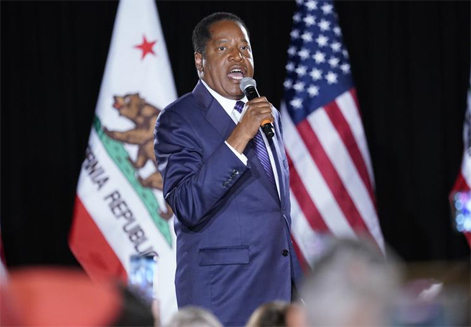|
Gov.
Gavin
Newsom,
middle
right,
gestures
next to
his
wife,
Jennifer
Siebel
Newsom,
foreground,
and
their
daughter,
Brooklynn,
bottom,
after
speaking
to
volunteers
in San
Francisco,
Tuesday,
Sept.
14,
2021.
The
recall
election
that
could
remove
California
Democratic
Gov.
Newsom
is
coming
to an
end.
Voting
concludes
Tuesday
in the
rare,
late-summer
election
that has
emerged
as a
national
battlefront
on
issues
from
COVID-19
restrictions
to
climate
change.
(AP
Photo/Jeff
Chiu) |
|
|
|
|
|
 |
 |
 |
|
|
|
|
|
|
 |
|
|
Republican
conservative
radio
show
host
Larry
Elder
speaks
after
losing
the
California
gubernatorial
recall
election
Tuesday,
Sept.
14,
2021, in
Costa
Mesa,
Calif.
The
rare,
late-summer
election,
which
challenged
California
Gov.
Gavin
Newsom,
emerged
as a
national
battlefront
on
issues
from
COVID-19
restrictions
to
climate
change.
(AP
Photo/Ashley
Landis) |
| |
Newsom
soundly
defeats
California
recall
attempt
By
Phil
Willon,
Taryn
Luna,
and
Julia
Wick
latimes.com
SACRAMENTO
-
California
Gov.
Gavin
Newsom
survived
a
historic
recall
election
Tuesday,
winning
a major
vote of
confidence
during a
COVID-19
pandemic
that has
shattered
families
and
livelihoods
and
tested
his
ability
to lead
the
state
through
the
largest
worldwide
health
crisis
in
modern
times.
The
recall
offered
Republicans
their
best
chance
in more
than a
decade
to take
the helm
of the
largest
state in
the
union.
But the
effort
was
undercut
when
Newsom
and the
nation’s
leading
Democrats,
aided by
visits
to
California
by
President
Biden
and Vice
President
Kamala
Harris,
portrayed
the
campaign
to oust
the
governor
as a
“life
and
death”
battle
against
“Trumpism”
and
far-right
anti-vaccine
activists.
Conservative
talk
show
host
Larry
Elder
led the
46
candidates
on the
second
question
on the
ballot
hoping
to
become
governor,
but that
became
meaningless
after a
majority
of
California
voters
decided
to keep
Newsom
in
office.
Moments
after
national
television
networks
called
the
election
for
Newsom,
the
governor
walked
into the
California
Democratic
Headquarters
in
Sacramento
to talk
with
reporters,
forgoing
a
victory
celebration
as is
commonplace
in
traditional
campaigns.
Appearing
resolute,
Newsom
cast the
rejection
of the
recall
as a
vote in
support
“of all
those
things
we hold
dear as
Californians.”
His
victory,
he said,
was a
victory
for
science-based
COVID-19
vaccines
to end
the
pandemic
and
abortion
rights
for
women,
as well
as
economic
and
racial
justice.
“I’m
humbled
and
grateful
to the
millions
and
millions
of
Californians
that
exercised
their
fundamental
right to
vote and
express
themselves
so
overwhelmingly
by
rejecting
the
division,
by
rejecting
the
cynicism,
rejecting
so much
of the
negativity
that’s
defined
our
politics
in this
country
over the
course
of so
many
years,”
Newsom
said.
Newsom,
53,
spent
part of
election
day at
an
anti-recall
rally in
a San
Francisco
union
hall,
and
warned
supporters
about
the
consequences
to
California’s
economy
and the
public
health
of its
nearly
40
million
residents
if he
was
recalled
and
replaced
with
Elder,
who had
vowed to
repeal
the
state’s
mask and
vaccination
mandates.
“California
has
outperformed
Florida,
Texas,
Indiana,
the
United
States
as a
whole in
not only
health
outcomes,
but
economic
outcomes,”
Newsom
told
reporters.
“Our
economy
contracted
at a
more
modest
rate
than
those
states.”
Newsom
also
criticized
both
Elder
and
former
President
Trump
for
saying
Tuesday’s
election
was
rigged,
calling
those
unfounded
allegations
a threat
to
democracy
and
continuation
of the
“big
lie”
that the
2020
presidential
election
was
stolen
from
Trump.
“This
election
fraud
stuff is
a crock;
it’s
shameful.
And when
I say
that, I
mean
that,”
he said.
The
mood
inside
Larry
Elder’s
official
election
night
party at
the
Costa
Mesa
Hilton
remained
defiant,
even
after
nearly
every
major
news
outlet
had
declared
the
recall
effort
dead.
“Let’s
be
gracious
in
defeat,”
Elder
told his
supporters
a little
more
than two
hours
after
polls
closed.
“We may
have
lost the
battle
but we
are
going to
win the
war.”
At
times,
Elder’s
address
resembled
his
stump
speeches
with a
focus on
crime,
homelessness,
housing
and
education
— and
ample
shots at
Newsom.
He ended
his
speech
with a
teaser
about
his
plans
for
California’s
2022
gubernatorial
election.
“As
a former
radio
host,
let me
just say
this:
Stay
tuned,”
Elder
said.
For
Newsom,
the
electoral
triumph
capped
an
extraordinary
eight-week
fight
for his
political
survival
that
came
less
than
three
years
after he
won the
governor’s
office
by the
largest
margin
in
modern
history.
Newsom’s
campaign
to
defeat
the
recall
effort
began on
an
upbeat
note,
with the
governor
touting
that
California
was
“roaring
back”
thanks
to lower
COVID-19
infection
rates in
the
state
and
efforts
to
ensure
residents
got
vaccinated.
The
state’s
restrictions
and
shutdowns
were
lifted.
Baseball
stadiums
overflowed
with
fans
starting
in June,
people
were
dining
inside
restaurants
and,
Newsom
promised,
public
schools
would be
open for
the new
academic
year.
Newsom
and his
political
allies
had
prevented
any
prominent
Democrats
from
jumping
into the
field of
replacement
candidates,
eliminating
a
credible
alternative
for
left-leaning
Californians
who may
have
soured
on the
governor.
But
in late
July,
just
after
the
recall
election
was
officially
certified
for the
ballot,
cause
for
concern
surfaced
for
Newsom:
A poll
showed
that
likely
voters
in
California
were
almost
evenly
split
over
whether
to toss
the
governor
out of
office,
a dire
sign in
a state
where
Democratic
voters
outnumber
Republicans
almost 2
to 1.
Political
scientist
Mindy
Romero,
director
of USC’s
Center
for
Inclusive
Democracy,
said the
lingering
aftereffects
of
Newsom’s
COVID-19
policies
probably
made
some
voters
who
supported
him in
the 2018
election
indifferent
this
time
around.
She
said
they
held
Newsom
“at
least
partially
responsible”
for the
government-mandated
restrictions
that
devastated
businesses
and
forced
schoolchildren
to stay
home in
distance-learning
programs.
Under
Newsom’s
watch,
the
state
also
paid out
billions
of
dollars
in
fraudulent
unemployment
benefits
while at
the same
time
millions
of
out-of-work
Californians
with
legitimate
claims
faced
frustrating,
lengthy
delays
in
receiving
their
payments.
Romero
said
Newsom’s
most
costly
mistake
came in
November
when
recall
supporters
were
struggling
to
gather
enough
petition
signatures
to
qualify
for the
ballot.
Newsom
attended
a
lobbyist’s
birthday
party at
the
upscale
French
Laundry
restaurant
in the
Napa
Valley
after he
had
pleaded
with
Californians
to stay
home and
avoid
multifamily
gatherings.
Recall
proponents
seized
on that,
criticizing
Newsom
as an
out-of-touch
elitist
and
hypocrite
who
thought
he was
above
the
rules he
imposed
on other
Californians.
Romero
said
that
message
was
“simple
and
intuitive
for
people
to
understand.”
It
appealed
to
voters
across
the
political
spectrum
and
lingers
still,
she
said.
“This
never
should
have
gotten
close,”
Romero
said.
“This
whole
process
has
damaged
the
governor.”
Dave
Gilliard,
one of
the
Republican
strategists
who led
the
effort
to oust
the
governor,
said
Newsom
was in
serious
trouble
up until
August.
That
changed
once
Elder
emerged
as the
leading
contender
to
replace
Newsom
as
governor.
“He
was in
bad
shape,”
Gilliard
said.
“Once
the
focus
moved
away
from
Newsom
and to
his
opponent,
Elder in
this
case,
his
numbers
improved
greatly.
He was
able to
get
Democrats
interested
again in
the
election.”
Elder
was a
perfect
foil,
Gilliard
said.
The
Republican
opposed
abortion
rights
and
supported
offshore
oil
drilling,
anathema
to the
state’s
Democratic
majority.
Elder
has also
been a
die-hard
supporter
of
Trump,
an
immensely
unpopular
figure
in
California.
In fact,
Gilliard
said,
recall
proponents
pleaded
with
Trump’s
advisors
to
“convince
him to
stay out
of it,”
which
was
successful
until
recent
days
when he
started
making
baseless
claims
that
California’s
recall
election
was
“rigged.”
Most
consequential,
Gilliard
said,
was
Elder’s
vow to
repeal
the
Newsom
administration’s
mandates
requiring
students
to wear
masks in
public
schools
and
teachers,
state
employees
and
healthcare
workers
to be
vaccinated.
This at
a time
when the
Delta
variant
was
raging
and most
Californians
supported
Newsom’s
actions
to stem
the
spread
of the
coronavirus.
“Elder
allowed
Newsom
to bring
Trump
back
into it,
at least
Trumpism,
when it
came to
masks
and
vaccines,”
Gilliard
said.
“When
you
combine
that
with the
Delta
variant,
and that
people
were all
of the
sudden
extremely
concerned
again
about
COVID,
the
timing
for
Newsom
could
not have
been
better.”
At
stake
was the
most
powerful
elected
office
in a
state of
nearly
40
million
people,
one
beset by
homelessness,
a dire
shortage
of
affordable
housing,
increases
in
violent
crime
and with
thousands
of
businesses
that
closed
or still
struggle
after
statewide
shutdowns
during
the
height
of the
pandemic.
Newsom
is the
second
California
governor
to have
faced a
recall
election,
which
was
projected
to cost
$276
million
dollars,
a price
tag
blasted
by
Democrats.
In 2003,
California
voters
upset
over
rolling
power
outages,
budget
cuts and
a steep
increase
in
vehicle
license
fees
recalled
Democratic
Gov.
Gray
Davis
from
office
and
elected
actor
Arnold
Schwarzenegger,
who
remains
the last
Republican
to have
served
as the
state’s
chief
executive.
The
spectacle
of the
2003
recall
election
entranced
the
nation
with its
only-in-California
cast of
political
candidates,
which,
along
with
Schwarzenegger,
included
Hustler
magazine
founder
Larry
Flynt,
Huffington
Post
cofounder
Arianna
Huffington
and
“Diff’rent
Strokes”
star
Gary
Coleman.
By
comparison,
the 2021
sequel
fell
flat.
Reality
television
star and
former
Olympic
decathlete
Caitlyn
Jenner
tried to
capture
some of
the
Schwarzenegger
magic
but did
not win
over
California
voters
despite
her
visibility
in cable
television
news
coverage.
A
half
hour
after
the
polls
closed,
Jenner
addressed
a crowd
of her
supporters
gathered
at the
Stonehaus,
an
upscale
restaurant
and wine
bar in
Westlake
Village,
acknowledging
her
disappointment
in early
election
results
but
thanking
her
supporters
for such
a
positive
reaction
to her
candidacy.
“I
love
this
state. I
don’t
want to
see it
go
downhill
any
farther
than it
has
already
gone
downhill,
and
honestly,
the
future
doesn’t
look
good,”
she
said.
Asked if
she
would
run for
office
in 2022,
Jenner
was
somewhat
coy.
“We
will
see. I’m
71 years
old.
Playing
in the
fourth
quarter.
Feeling
like
there’s
a lot of
life
left in
me,” she
said.
“We’ll
see what
path
that
takes.”
Trying
to, as
he put
it, make
his
campaign
more
“beastly,”
Republican
John Cox
at one
point
enlisted
help
from a
1,000-pound
Kodiak
bear
named
Tag to
drum up
interest
in his
campaign
to
replace
Newsom.
Neither
the bear
nor the
$7.6
million
he
poured
into the
race
helped
replicate
the
success
he had
in 2018,
when he
won
enough
voter
support
in the
gubernatorial
primary
to face
Newsom
in the
general
election
— only
to be
trounced.
On
Tuesday
night in
San
Diego,
Cox said
he plans
to
explore
running
for
governor
again in
2022.
“Hopes
and
dreams
are
dashed
by the
poor
opportunities
in this
state,”
Cox
said.
“This
battle
has just
begun.
This
state
has to
improve
… I’m
not
going to
quit.
I’m
going to
stay
active.”
Kevin
Paffrath,
who
boasts
1.7
million
followers
on his
YouTube
channel,
had the
highest
profile
of the
little-known
Democrats
on the
ballot,
even
managing
to make
it to
the
stage
during
one of
the
candidate
debates.
Paffrath,
who
proposed
building
a
pipeline
to the
Mississippi
River to
alleviate
California’s
devastating
drought,
was
expected
to have
a
relatively
strong
showing
in the
election,
perhaps
even
challenging
the
success
of
Republican
Kevin
Faulconer,
the
former
mayor of
San
Diego.
As a
fiscal
conservative
with
moderate
to
liberal
positions
on
social
issues,
including
abortion,
immigration
and the
environment,
Faulconer
was long
seen as
the
Republican
Party’s
greatest
hope to
recapture
the
governor’s
office.
But his
campaign
foundered,
in part,
because
the
pro-Trump
core of
the
California
Republican
Party
was
solidly
behind
Elder.
Tuesday
night
Faulconer
blamed
the
apparent
failure
of the
recall
on a
mid-campaign
shift of
focus of
the
public’s
attention
away
from
what
critics
called
Newsom’s
shortcomings
as
governor.
“Here’s
the
reality:
The
recall
stopped
being
about
Newsom
and it
turned
into a
fight
over
personalities
and
national
politics,”
Falconer
said at
a
campaign
event in
Point
Loma’s
Liberty
Station
neighborhood.
“Newsom
didn’t
change,
the
recall
did.”
Candidate
and
state
Assemblyman
Kevin
Kiley
(R-Rocklin)
said the
recall
was
about
creating
a
movement
as much
as it
was
about
replacing
Newsom.
Joining
Kiley’s
watch
party in
Lincoln
was
former
U.S.
Rep.
Doug
Ose, who
dropped
out of
the
recall
race
last
month
after
suffering
a heart
attack.
“We
built
something
more
powerful
than one
political
objective,”
Kiley
said
after
hearing
that
some
outlets
had
called
the race
for
Newsom.
“I would
have
liked to
have
seen the
recall
be a
success.
I would
have
liked to
have a
new
governor.
I would
have
liked to
have
been
that new
governor.
But this
moment
is just
getting
started.”
Times
staff
writers
Susanne
Rust,
Melody
Gutierrez,
Faith E.
Pinho
and
Robin
Estrin
and San
Diego
Union
Tribune
staff
writers
David
Garrick
and
Deborah
Sullivan
Brennan
contributed
to this
report.
Advertise With Us:

Certified Minority Business Enterprise

|
|
|
|
|
|
|
|
|